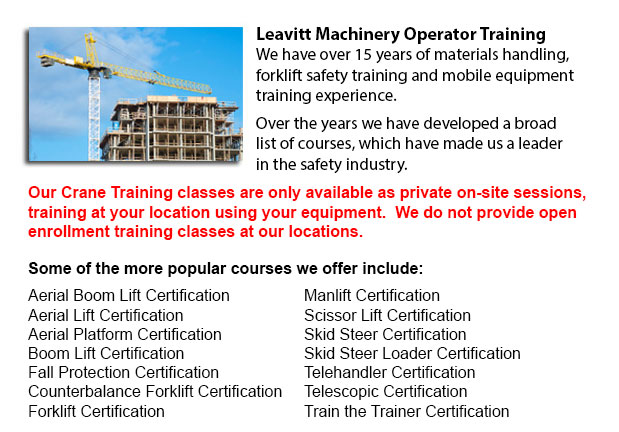
Crane Safety Training Moose Jaw - Both crane operator as well as their employers must be aware of all the possible problems related to the use of an overhead crane. All across North America, there is legislation which provides rules for the safe inspection, maintenance and operation of lifting equipment. Crane Safety courses help owners and managers of cranes accredit their operators in accordance with provincial legislation.
We have designed several training courses to be able to equip operators with all the skills and knowledge considered necessary to be able to make crane lifting easier and safer. Training the operator helps to lengthen the crane's life span by guaranteeing crane's safe operation and high performance.
Articulated cranes under 16,000 lbs. capacity could only be operated by operators who are accredited. Operators have to be knowledgeable about the operational characteristics and features of the machinery. Before use, a pre-operational machine check should be done. There is a legal requirement to do a pre-operational inspection as well as an inspection of the overhead conditions and work-site ground.
The guidelines provided in the manufacturer manual gives information on maintenance, inspection, and loading and unloading operations. According to legislation, annual and daily inspections are mandatory. Operators are needed to maintain an up-to-date logbook in nearly all places. They may be needed to validate equipment warranties.
Adding remote control devices to the cranes is usually suggested. Remote control improves safety by allowing the operator an easier option for handling the crane.
Prioritizing crane safety helps a company's bottom line. Businesses which follow safe machine practices usually enjoy greater cost savings compared to those which don't. The chance of personal injury and machine damage is greatly reduced if an operator who is well-trained is handling the crane. Safety conscious drivers are more productive leading to reduced times required for unloading and loading.
-
Telehandler Training Courses Moose Jaw
Telehandler Training Courses Moose Jaw - Employers are responsible for making sure that their supervisory and operating personnel are trained to work competently making use of telehandler equipment. The competence level of workers need to be assessed... More -
Boom Lift Ticket Moose Jaw
Boom Lift Ticket Moose Jaw - Boom Lifts are a platform lift piece of equipment that could be lifted or lowered to differing heights, making this device a helpful instrument for certain industrial functions. There are some unique types of Boom Lift co... More -
Operator Safety Training, Re-Qualification Training, In-House Instructor Training in Moose Jaw
Utilized in nearly all industrial construction sites, warehouse operations or boat yards, the lift truck is a very important part in order to help lift and transport goods. The reach feature of a lift truck can help better the applications that the l... More -
Heavy Equipment Training Schools Moose Jaw
Heavy Equipment Training Schools Moose Jaw - There are many heavy equipment training schools to choose from. If you want to get to the best, it is important to examine several factors of the school in order to determine the level of education you wil... More -
Counterbalance Forklift Training Moose Jaw
Counterbalance Forklift Training Moose Jaw - Demand is always high for our popular Counterbalance Forklift Truck Training courses. A Counterbalance forklift refers to a forklift along with a weight that counters the balance, enabling the load's weigh... More -
Forklift Training Program Moose Jaw
Forklift Training Program Moose Jaw - Lift trucks are occasionally referred to as jitneys, hi los or lift trucks. These powered industrial trucks are utilized widely today. Department stores used forklifts in order to unload merchandise from trailers... More -
Forklift Ticket Moose Jaw
Forklift Ticket Moose Jaw - Pallet jacks and forklifts are both intended for practically the same reason; to transfer goods from a place of your warehouse to another. This is basically where the comparison stops however. With the pallet jack, the ben... More -
Forklift Operator Certification Moose Jaw
Forklift Operator Certification Moose Jaw - Forklift operator certification is normally needed for employees working in construction, warehouse or industrial setting to guarantee the safe operation of forklifts. Workplace training has to follow a met... More

Forklift Training Moose Jaw
TOLL FREE: 1-888-254-6157
Moose Jaw, Saskatchewan
forklifttrainingmoosejaw.com
Email Us
About Us


